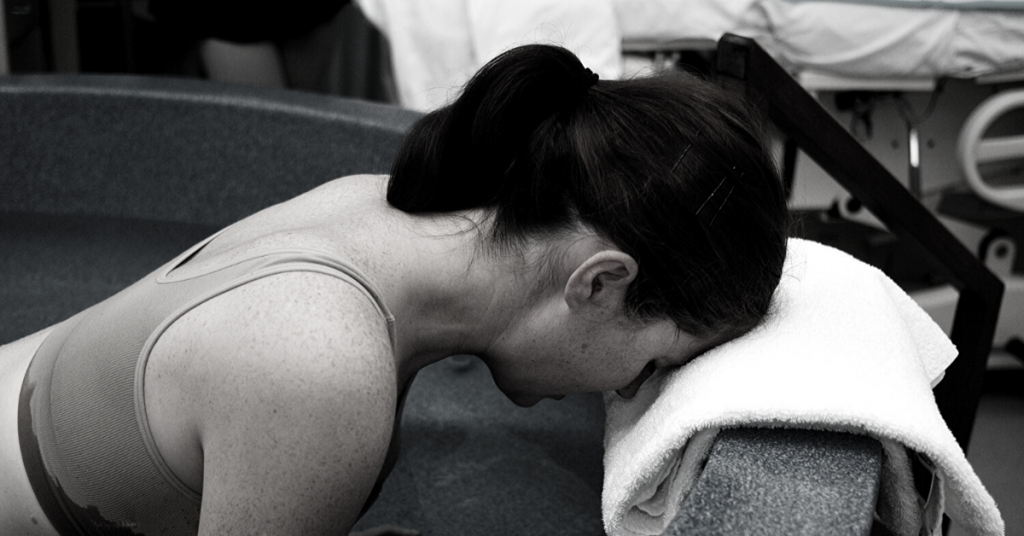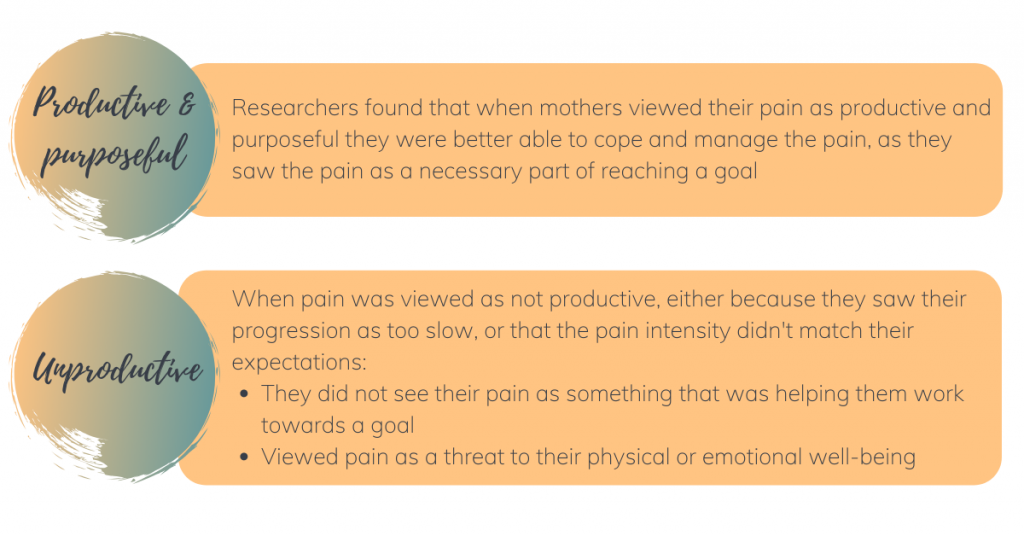For those approaching labour and delivery for the first time (or maybe even for those who have been through it before), it can feel like it will be an experience out of your control. And while that is true to some extent – length, intensity, and the pattern of progress is different for everyone, there is so much you can do to impact what your experience looks like.
We’ve talked about how movement and positioning can play a role (here), and how the right childbirth education class can dramatically change outcomes (here), but something as simple as your mindset, your attitude going into labour and delivery, can play a large role as well.
But before we can get into that, why are we talking about this? Why does it matter that you can impact the pain you experience during childbirth if you have already decided you definitely want an epidural?
There are a few reasons:
- Labours are long! It is almost guaranteed you will labour without an epidural, as recommendations state hospital admission should be delayed until 4 cm + dilation is reached1
- People who manage pain with various techniques (massage, movement, water) before receiving an epidural report more satisfaction with their labours2
- While epidurals are very effective in managing pain, they are not associated with more positive labour experiences3,4

How does mindset influence pain experiences in labour?
Attitude before labour:
In the Netherlands, 22% of women use an epidural during childbirth compared to 58% in Canada5 and 61% in USA.6 To examine why this might be so, researchers interviewed 40 post-partum women in the Netherlands.7
Researchers found participants:
- Saw birth as a non-medical event
- Trusted that their body knew what to do and that instinct would take over
- Thought that women’s bodies were made to birth without medicines, and in most circumstances have an inherent capability to do so
- Viewed pain as a manageable and purposeful part of birth
- Thought epidurals and medicines should be used only when necessary
- Valued autonomy – being in control of what happens to them, of making their own decisions, and of not losing control of their body and instincts through the use of epidurals
Other evidence that mindset before labour influences the need for pain relief comes from a 2014 study of planned homebirths in the US.8

Attitude before labour and labour length:
In 2019, one study looked at attitudes toward labour pain and length of labour in 230 people pregnant with their first child. Researchers looked at questionnaire responses prior to labour and found that 80% of participants had a negative attitude towards labour pain and 20% had a positive attitude.9

Attitude towards labour pain had no impact on the length of the third stage of labour – which is when the placenta is expelled.
Mindset during labour:
A 2017 study sought to develop a more complete understanding of labour pain by talking to women about their labour experiences. It found that there are two states of mind during labour, and that women can move between the two:10,11
Mindful acceptance – Focussed, open, and accepting of the inner experience, including pain. It is accompanied by a more positive reporting of the labour experience
Distracted and distraught – Distracted, pain catastrophizing (focus/exaggerate threat of pain and negatively evaluate ability to deal with it), self-judgement, and a negative evaluation of pain

Researchers also found that the social environment played a large role in determining if pain was viewed as productive and purposeful, or as threatening.
Labouring people needed to feel safe, supported, and that the people in the room were calm and confident. When they lacked the support of their preferred caregiver, or when strangers were in the room that were unwanted, their pain experience was impacted, and they felt unsupported and like they needed help.
What factors influence birth satisfaction more than pain relief?
In 2002 researchers looked at 137 reports to assess factors that influence women’s evaluations of their childbirth experiences.12

The influences of pain, pain relief, and medical interventions on birth satisfaction are not as powerful as the influences of the attitudes and behaviours of the caregivers.
What does all this information mean?
- Mindset and attitudes about labour and pain impact birth experiences
- Fostering a positive attitude prior to labour may help shorten it
- Attitudes associated with a decreased use of epidurals include seeing birth as a non-medical event and that pain is manageable and purposeful
- Ultimately, birth satisfaction may not be dependent on whether or not pain relief is used, but whether personal expectations are met, if there is adequate and quality caregiver support, and that the person labouring is involved in decision making
References: 1. Lee L, et al. JOGC. 2016; 38(9):843-865; 2. Chaillet N, et al. Birth. 2014; 41(2):122-137; 3. Jones L, et al. Cochrane Database Syst Rev. 2012; 3:CD009234; 4. Lindholm A, et al. Sex Reprod Healthc. 2015; 6(2):74-81; 5. Public Health Agency of Canada. Family-centred maternity and newborn care: National guidelines. Ottawa (ON): 2018; 6. Osterman MJ, et al. Natl Vital Stat Rep. 2011; 59(5):1-13; 7. Logsdon K, et al. Midwifery. 2017; 55:67-74; 8. Cheyney M, et al. J Midwifery Womens Health. 2014; 59(1):17-27; 9. Beigi SM, et al. J Educ Health Promot. 2019; 8:130; 10. Whitburn LY, et al. Midwifery. 2014; 30(9):1029-35; 11. Whitburn LY, et al. BMC Pregnancy and Childbirth. 2017; 17:157-167; 12. Hodnett ED. Am J Obstet Gynecol. 2002; 186(5 Suppl Nature):S160-172
Disclaimer: The information in this post absolutely does not constitute advice from a healthcare professional and is solely intended to provide you with general information. Each person is unique with individual circumstances, and as such some or all information may not apply to you.
This information does not substitute for your healthcare provider’s medical advice and should not be relied upon as such. Before making any decisions, be sure to reach out to a qualified healthcare professional. If you are pregnant and need to be examined, please see a physician, nurse practitioner, midwife or obstetrician.
We strive to ensure that the information provided is accurate, evidence-based, and reliable, but cannot guarantee that it is error-free or complete.

